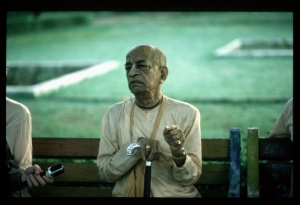SB 4.3.13: Difference between revisions
m (1 revision(s)) |
(Vanibot #0018 edit: make synonym terms in Sanskrit italic in SB - Vanisource) |
||
| Line 1: | Line 1: | ||
{{info | {{info | ||
|speaker=Satī, wife of Lord | |speaker=Satī, wife of Lord Śiva | ||
|listener=Lord | |listener=Lord Śiva | ||
}} | }} | ||
[[Category:Srimad-Bhagavatam - Canto 04 Chapter 03]] | |||
[[Category:Bhagavatam Verses Spoken by Sati, wife of Lord Siva - Vanisource|040313]] | |||
<div style="float:left">'''[[Srimad-Bhagavatam]] - [[SB 4|Fourth Canto]] - [[SB 4.3: Talks Between Lord Siva and Sati|Chapter 3: Talks Between Lord Śiva and Satī]]'''</div> | |||
<div style="float:right">[[File:Go-previous.png|link=SB 4.3.12]] '''[[SB 4.3.12]] - [[SB 4.3.14]]''' [[File:Go-next.png|link=SB 4.3.14]]</div> | |||
{{RandomImage}} | |||
==== TEXT 13 ==== | ==== TEXT 13 ==== | ||
<div | <div class="verse"> | ||
kathaṁ sutāyāḥ pitṛ-geha-kautukaṁ | :kathaṁ sutāyāḥ pitṛ-geha-kautukaṁ | ||
niśamya dehaḥ sura-varya neṅgate | :niśamya dehaḥ sura-varya neṅgate | ||
anāhutā apy abhiyanti sauhṛdaṁ | :anāhutā apy abhiyanti sauhṛdaṁ | ||
bhartur guror deha-kṛtaś ca ketanam | :bhartur guror deha-kṛtaś ca ketanam | ||
</div> | </div> | ||
| Line 16: | Line 22: | ||
==== SYNONYMS ==== | ==== SYNONYMS ==== | ||
<div | <div class="synonyms"> | ||
''katham''—how; ''sutāyāḥ''—of a daughter; ''pitṛ-geha-kautukam''—the festival in the house of her father; ''niśamya''—hearing; ''dehaḥ''—the body; ''sura-varya''—O best of the demigods; ''na''—not; ''iṅgate''—disturbed; ''anāhutāḥ''—without being called; ''api''—even; ''abhiyanti''—goes; ''sauhṛdam''—a friend; ''bhartuḥ''—of the husband; ''guroḥ''—of the spiritual master; ''deha-kṛtaḥ''—of the father; ''ca''—and; ''ketanam''—the house. | |||
</div> | </div> | ||
| Line 23: | Line 29: | ||
==== TRANSLATION ==== | ==== TRANSLATION ==== | ||
<div | <div class="translation"> | ||
O best of the demigods, how can the body of a daughter remain undisturbed when she hears that some festive event is taking place in her father's house? Even though you may be considering that I have not been invited, there is no harm if one goes to the house of one's friend, husband, spiritual master or father without invitation. | O best of the demigods, how can the body of a daughter remain undisturbed when she hears that some festive event is taking place in her father's house? Even though you may be considering that I have not been invited, there is no harm if one goes to the house of one's friend, husband, spiritual master or father without invitation. | ||
</div> | </div> | ||
__NOTOC__ | |||
<div style="float:right; clear:both;">[[File:Go-previous.png|link=SB 4.3.12]] '''[[SB 4.3.12]] - [[SB 4.3.14]]''' [[File:Go-next.png|link=SB 4.3.14]]</div> | |||
__NOTOC__ | |||
__NOEDITSECTION__ | |||
Revision as of 20:45, 30 November 2017

A.C. Bhaktivedanta Swami Prabhupada
TEXT 13
- kathaṁ sutāyāḥ pitṛ-geha-kautukaṁ
- niśamya dehaḥ sura-varya neṅgate
- anāhutā apy abhiyanti sauhṛdaṁ
- bhartur guror deha-kṛtaś ca ketanam
SYNONYMS
katham—how; sutāyāḥ—of a daughter; pitṛ-geha-kautukam—the festival in the house of her father; niśamya—hearing; dehaḥ—the body; sura-varya—O best of the demigods; na—not; iṅgate—disturbed; anāhutāḥ—without being called; api—even; abhiyanti—goes; sauhṛdam—a friend; bhartuḥ—of the husband; guroḥ—of the spiritual master; deha-kṛtaḥ—of the father; ca—and; ketanam—the house.
TRANSLATION
O best of the demigods, how can the body of a daughter remain undisturbed when she hears that some festive event is taking place in her father's house? Even though you may be considering that I have not been invited, there is no harm if one goes to the house of one's friend, husband, spiritual master or father without invitation.